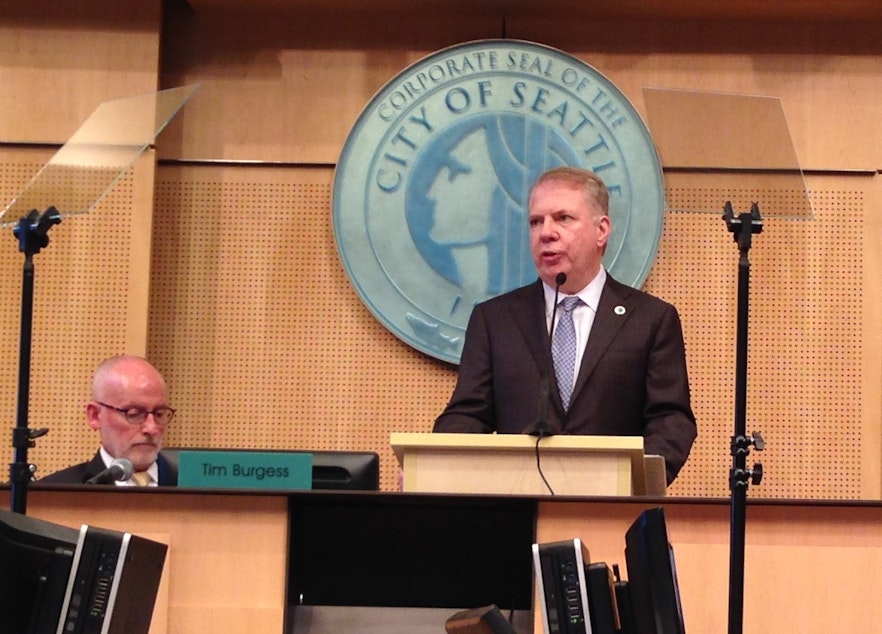Mayor Ed Murray: City Revenues Are Not Keeping Up

In his first budget speech since taking office, Seattle Mayor Ed Murray laid out his priorities for the next two years, pledging a more efficient, transparent and better performing city government.
Before a packed City Council chambers, Murray outlined several new initiatives, including an expansion of the police force and the creation of a new cabinet-level department.
But Murray also noted that in this time of economic prosperity, city revenues have not kept up.
“The fact is, Seattle today faces a paradox,” he said. “We are now the fastest growing city in America, and yet the city budget is not keeping pace with existing demand for services.”
Mayor Murray’s proposed budget adds 190 new staff members to city government. He is proposing a cabinet level Department of Education and Early Learning, Office of Domestic Violence, and Office of Labor Standards to help employers and employees with the new minimum wage law.
Sponsored
During his mayoral campaign, Murray had pledged to add 100 new police officers to the force.
“My budget commits to funding to ensure that by end of 2015, we are halfway towards that goal, and by the end of 2016 we will have the highest number of fully trained officers in Seattle Police Department’s history,” Murray said.
Budget officials say city revenues are now marginally better than expected, thanks to the construction boom that is underway in the city. Sales taxes on construction materials and equipment are largely responsible for a $7 million revenue boost this year.
But property taxes account for about a quarter of the city's general fund revenue, and property tax increases are capped by state law. After the recession, consumer spending in the city has also been slow to rebound, and retail sales tax receipts have lagged, according to the city. Sales taxes account for about 20 percent of the city’s general fund.
There are several theories as to why, according to Ben Noble, the city’s budget director.
Sponsored
“Coming out of the recession, people are being conservative about how they spend their money,” he said. Young people are also coming out of college with significant student debt, so that is changing spending patterns, he said.
At the same time, Murray says demand for city services is on the rise. Over the last three years, the homeless population has grown by nearly a third, according to Murray, and state and county funding for homeless services have been reduced.
Murray's budget now goes to the City Council, where Councilmember Nick Licata is chair of the Budget Committee. Licata said he may propose raising additional revenue — possibly with a head tax on employees in the city — to fully fund police and human services.
That's an option that Murray may not support.
"In building the budget, the mayor's clear direction was that he was not interested in imposing new taxes," Noble said. With the city's new minimum law about to take effect, "he didn't think it was time to impose additional burdens on the businesses in Seattle."

